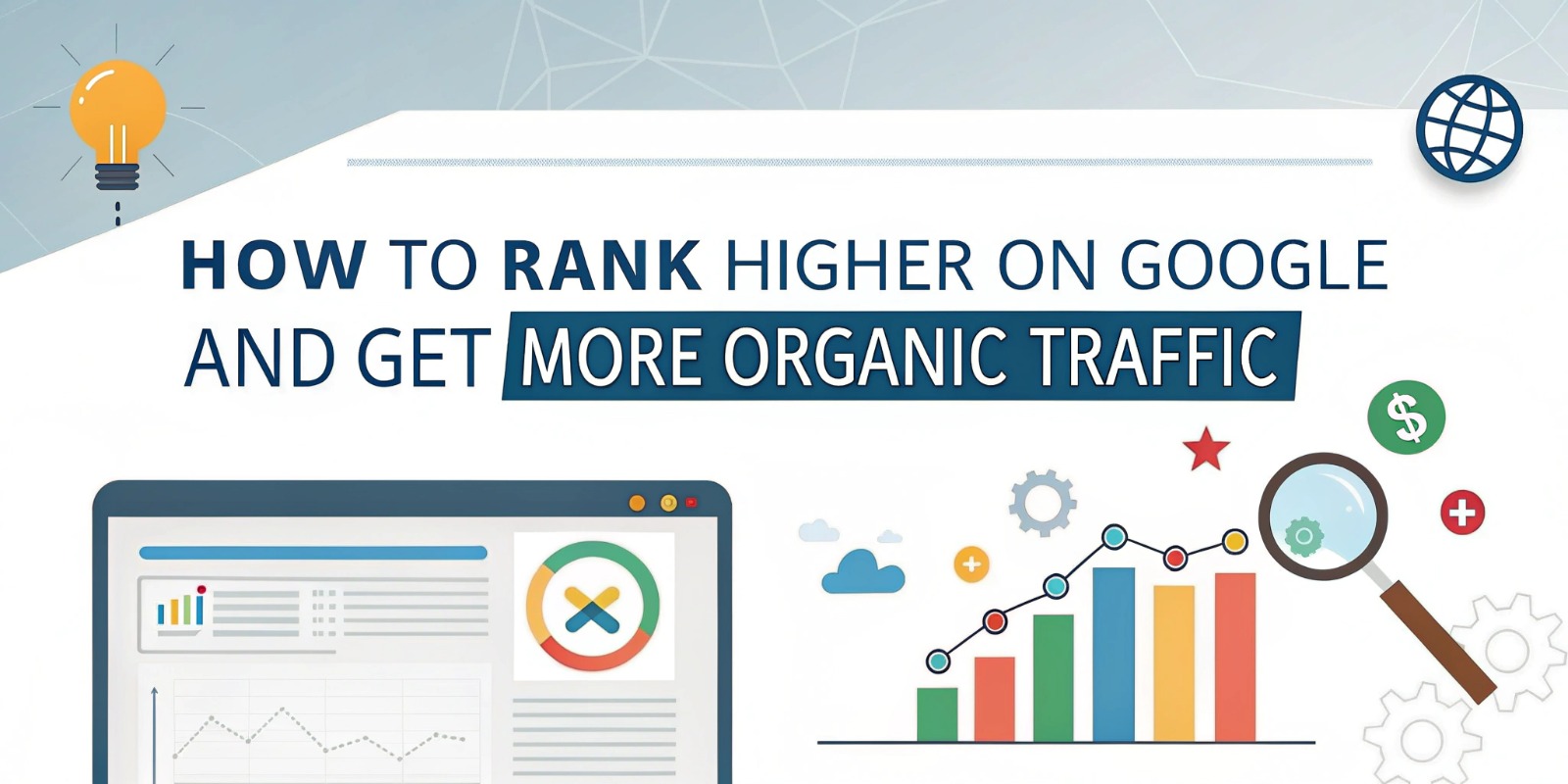Introduction
In today's digital world, ranking higher on Google is essential for anyone who wants to grow their online presence, be it businesses, bloggers, or content creators. Without visibility on search engines like Google, even the most beautifully designed websites can struggle to attract visitors. That's where Search Engine Optimization (SEO) comes into play. SEO is the process of improving a website's visibility on Google and other search engines to drive more organic traffic. By learning the best practices and strategies for SEO, you can boost your site's ranking, gain more exposure, and ultimately attract more traffic.
This guide will take you through some of the most effective SEO strategies you can implement to improve your site's position on Google. Additionally, enrolling in an SEO course, whether it's an SEO course online or a Google SEO course, can provide a deeper understanding of these techniques and help you apply them more efficiently to get the best results.
Understanding Google's Ranking Factors
Google's ranking algorithm considers over 200 factors when deciding which websites to rank higher in search results. While not all of these factors are within our control, focusing on some of the most important ones can help you improve your search rankings. Here are a few key elements that Google uses to rank websites:
- High-quality content: Google prioritizes websites with valuable, well-written, and informative content.
- Keyword optimization: Using the right keywords that match user intent is essential for ranking.
- Backlinks from authoritative websites: High-quality backlinks are one of the most important ranking factors.
- User experience (UX) and website structure: Websites that provide a good user experience tend to rank better.
- Mobile-friendliness: With mobile-first indexing, your website must perform well on mobile devices.
- Page speed optimization: Faster websites rank better because they provide a better user experience.
- Technical SEO: Proper technical setup helps search engines crawl and index your website more easily.
Understanding and implementing these factors correctly is essential for SEO success. By enrolling in a Google SEO course, you can gain in-depth knowledge of these elements and how to apply them effectively to improve your rankings.
1. Create High-Quality Content
Content is the backbone of SEO. Google loves websites that provide valuable, relevant, and informative content. If you want to rank higher on Google, it's essential to create high-quality content that meets the needs of your audience. Here's how you can do that:
- Write long-form, detailed articles: Articles that are comprehensive and cover topics in-depth tend to rank better. Aim for content that provides real value to your readers.
- Use Latent Semantic Indexing (LSI) keywords: These are related keywords that help improve content relevancy and make it easier for Google to understand what your page is about.
- Maintain originality: Avoid copying content from other sources. Google prefers unique content that offers a fresh perspective.
- Keep content updated: Google rewards fresh content. Regularly updating older posts ensures they remain relevant.
2. Keyword Research and Optimization
Keyword research is one of the most crucial steps in SEO. It helps you understand what terms and phrases your target audience is searching for. By using the right keywords, you can align your content with search intent and rank higher on Google. Here's how you can optimize your website's keywords:
- Use keyword research tools: Tools like Google Keyword Planner, Ahrefs, and SEMrush can help you find the most effective keywords for your content.
- Incorporate primary keywords: Include your primary keyword in the title, headings, meta description, and URL.
- Target long-tail keywords: Long-tail keywords (phrases that are longer and more specific) can help you capture users who are looking for specific information.
- Avoid keyword stuffing: Overuse of keywords can harm your rankings. Always prioritize natural, reader-friendly content.
By mastering keyword research, which you can learn from an SEO course online, you will be able to rank for the most relevant terms and drive more organic traffic.
3. Optimize On-Page SEO
On-page SEO refers to the practice of optimizing individual web pages to improve their ranking. It involves several key elements that
Don't miss your chance to enroll now.🚀 New Batch Starting Soon!
- Title tags: Make sure your title tags are under 60 characters and contain the main keyword.
- Meta descriptions: Write concise and compelling meta descriptions (under 160 characters) that include your target keywords.
- Header tags (H1, H2, H3): Properly structure your content with header tags to improve readability and SEO.
- Internal linking: Link relevant pages within your website to make it easier for users to navigate and for search engines to crawl your site.
- Image optimization: Compress images to reduce loading time and use alt text that includes relevant keywords.
Taking an SEO course online can give you a clear understanding of how to implement on-page SEO strategies effectively.
4. Build High-Quality Backlinks
Backlinks are one of the most important ranking factors. They act as votes of confidence from other websites, telling Google that your content is valuable. The more authoritative backlinks you have, the higher your website will rank. Here are some strategies to build quality backlinks:
- Guest blogging: Write guest posts for reputable websites in your niche and link back to your site.
- Broken link building: Find broken links on other websites and suggest your content as a replacement.
- Skyscraper technique: Identify high-ranking content in your niche, improve upon it, and then reach out to websites that link to the original content.
- Outreach: Build relationships with influencers and bloggers in your niche to get backlinks to your content.
A well-rounded backlink strategy is essential for improving your website's domain authority. Learning link-building techniques through an SEO course can be very beneficial.
5. Improve User Experience (UX) and Website Structure
Google values websites that offer a great user experience (UX). A well-designed, easy-to-navigate website is more likely to rank higher. Here's how you can improve your site's UX:
- Enhance navigation: Make sure visitors can easily find the information they need.
- Use clear Call-to-Actions (CTAs): Encourage user engagement with visible and effective CTAs.
- Improve readability: Break up large blocks of text with bullet points, short paragraphs, and visuals.
- Ensure mobile optimization: Your website must be fully responsive and provide a seamless experience on both desktop and mobile devices.
6. Optimize for Mobile and Page Speed
Google uses a mobile-first indexing approach, meaning that your mobile website's performance is just as important as your desktop version. To optimize for mobile and page speed, follow these tips:
- Responsive design: Make sure your website design adapts to all screen sizes, providing a smooth experience across devices.
- Improve site speed: Use tools like Google PageSpeed Insights to identify and fix issues that slow down your site. Compress images, enable caching, and remove unnecessary plugins.
- Minimize scripts: Keep the number of scripts on your site to a minimum to improve performance.
Learning mobile optimization and speed improvement techniques through an SEO course can make a significant difference.
7. Leverage Technical SEO
Technical SEO involves making your website more accessible to search engines by fixing issues that might prevent proper crawling and indexing. Here are some key elements of technical SEO:
- Create an XML Sitemap: This helps search engines understand the structure of your website.
- Use schema markup: Schema helps display rich snippets, improving visibility in search results.
- Fix broken links and 404 errors: Ensure that your website's links work correctly and do not lead to error pages.
- Use canonical tags: Prevent duplicate content issues by using canonical tags.
8. Focus on Local SEO
If your business serves a specific location, local SEO is crucial. Here's how you can optimize for local search:
- Claim and optimize your Google My Business (GMB) listing: This helps your business appear in local search results.
- Encourage customer reviews: Positive reviews on your GMB listing can boost your local rankings.
- Use location-based keywords: Include your city or region in your content and meta tags.
9. Regularly Monitor SEO Performance
Monitoring your SEO performance regularly is key to improving your strategy and achieving better rankings. Tools like Google Analytics, Google Search Console, and SEMrush help track important metrics like traffic, bounce rate, and keyword rankings. Google Analytics gives insights into user behavior and traffic sources, while Search Console helps identify issues like crawl errors and track your website’s performance in search results. Using SEMrush or Ahrefs can provide data on backlinks and competitor performance.
Regular monitoring allows you to make data-driven decisions, fix problems like slow-loading pages, or optimize underperforming content. It helps identify areas for improvement, such as high bounce rates or low conversion rates. Additionally, it helps you adjust to algorithm changes and stay competitive. By setting clear SEO goals and tracking progress, you ensure your strategy stays effective and aligned with your business objectives for long-term success.
10. Stay Updated with SEO Trends
SEO is always changing, with search engines like Google constantly updating their algorithms. To stay ahead of the competition, it’s important to keep up with the latest trends and updates. One of the best ways to do this is by following popular industry blogs like Moz, Search Engine Journal, and the Google Webmaster Blog. These blogs offer helpful tips, news, and updates on what’s happening in the world of SEO, so you can keep your strategies fresh and effective.
Another great way to stay updated is by joining SEO communities and forums where you can learn from others and share ideas. Taking an SEO course online is also a smart way to learn about the latest SEO techniques and best practices. Keeping up with these changes will help you improve your website’s rankings and stay competitive in the ever-evolving world of SEO. Regular learning and staying informed will ensure long-term success for your SEO strategy.
11. Utilize Social Media for SEO
Although social media signals don’t directly affect SEO rankings, they can still help improve your website's visibility and bring more traffic. By sharing your content on popular platforms like Facebook, Twitter, and LinkedIn, you can reach a wider audience. The more people engage with your posts—by liking, commenting, or sharing—the more likely it is that others will see your content, which could lead to valuable backlinks.
Backlinks are important because they show search engines that your content is trusted and relevant. Social media also helps to build your brand’s presence online, making it easier for people to find and share your content. While social media alone won't directly improve your rankings, it can certainly support your overall SEO efforts by increasing engagement, boosting visibility, and attracting more links to your site. Regular activity on social media can complement your SEO strategy and help drive more organic traffic.
12. Invest in Voice Search Optimization
Voice search is becoming more popular with the use of virtual assistants like Siri and Alexa. To stay ahead, it’s important to optimize your content for voice search. People use voice search in a more natural, conversational way, so focus on using keywords that match how people speak. For example, instead of just using short keywords, try including longer phrases or questions that someone might ask.
A good way to optimize for voice search is by structuring your content in a question-and-answer format. This makes it easier for virtual assistants to pick up your content when people ask questions. Think about the types of questions your audience might ask and tailor your content around those queries. By preparing for voice search, you can improve your chances of showing up in search results and reaching more users who rely on voice commands.
Conclusion
Ranking higher on Google and getting more organic traffic takes time, effort, and a well-thought-out plan. By creating great content, using the right keywords, improving how your website works, and focusing on technical SEO, you can slowly move up in search results and attract more visitors. Joining an SEO course online or a Google SEO course can help you improve your skills and keep you ahead of others in the field.
Start using these strategies today, stay consistent, and keep learning. Over time, you’ll see your website rise in the rankings, bringing in more visitors and helping your business grow. Keep improving, stay patient, and the hard work will pay off with more organic traffic and success.



